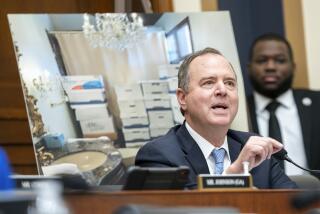‘Tea party’ remains resolute, with 2012 in view
Reporting from Washington — GOP leaders in Congress often seem to be bending over backward to please the most conservative flank of their party — but the gymnastics don’t appear to be doing the trick.
Like the vast majority of Americans, “tea party” activists say they disapprove of the way Congress is doing its job, but the reasons they offer are notably different than those heard elsewhere.
In interviews, leading activists in several states complained that Republicans were too quick to compromise and too accommodating to Democrats. They complained not of an insufficient effort on job creation, the top concern voiced by most Americans, but an inadequate attempt to rethink the role of government. They urged lawmakers to be more aggressive and stick to a pattern of brinkmanship that has brought spending cuts, along with repeated threats of federal shutdown and one near-default.
While most Americans are crying uncle, these grass-roots conservatives are pushing for more. In key races around the country, tea party activists already are backing primary challenges to some established Republican members of the House and Senate with others threatened.
“If there’s one common thread that I hear no matter where I am, it’s people saying, ‘The issue is we need to start changing out the people; we need new people in there,’ ” said Dawn Wildman, a tea party organizer in San Diego.
It is far from certain how many challenges will materialize, and even less clear how effective they will be. But already, the actions and views of this powerful constituency have limited the room to maneuver that Republicans have as they look at the remaining legislative battles of the year. Even though tea party groups had a spotty record of success in the 2010 election, the persistent threats are not easily ignored by GOP lawmakers running at a time when more than 80% of Americans say they are unhappy with Congress’ performance.
Two well-funded tea-party-aligned groups announced endorsements last week in primary battles. In Indiana, California-based Tea Party Express declared its support for Richard Mourdock, a Republican hoping to unseat six-term Sen. Richard G. Lugar.
FreedomWorks, a Washington-based group that supports the tea party movement, announced that its political arm would back Nebraska state Treasurer Don Stenberg in his bid for Senate. Stenberg is trying to snatch the nomination from establishment favorite Jon Bruning in what will likely be one of the most closely watched races. The winner will challenge Democratic Sen. Ben Nelson.
To the delight of Democrats, establishment Republican Senate candidates in Wisconsin and Michigan also face challengers from the right.
GOP House members in California, Michigan, Pennsylvania and Florida have all heard threats from unhappy grass-roots conservatives. In Indiana, Rep. Larry Bucshon faces a primary challenger critical of his vote for the compromise that raised the debt ceiling and avoided a federal default. The leader of a tea party group in New Hampshire declared he was “seriously considering” challenging Rep. Frank Guinta, citing the same vote.
“I voted for him, but the vote on raising the debt ceiling was the biggest vote he’ll make, and I feel he dropped the ball,” said Michael Malzone, who claims 400 members in his Merrimack Tea group. “We’ve got to reel in the spending; it’s the No. 1 problem in this country.”
Even House Speaker John A. Boehner is facing a primary opponent, although not one expected to post a serious challenge.
Many GOP lawmakers privately complain that some activists, many new to politics, cannot be pleased. But activists put the blame on what they call power-hungry politicians worried more about their careers than sticking to their principles. And as a group, tea party supporters are less likely to endorse compromise than are other Americans. In a Gallup poll released last week, 51% of those surveyed said lawmakers should compromise principles if that meant getting something done compared with 31% of tea party supporters.
“I don’t know what the hesitation is to bringing this whole issue to a head and getting it resolved,” said Michael Hintze, a tea party leader in Wisconsin. Referring to Congress’ passage of short-term spending bills, he added, “At some point you’ve got to stop passing these and say, ‘This far and no farther. Shut the government down, and get it done.’ ”
But the tea party definition of “getting it done” may be out of step with other Republicans, setting them up for disappointment. Hintze said he believed lawmakers could eliminate the national debt — now more than $14 trillion — in eight years, and no taxes should be raised to do so.
That’s a pace almost no one in Washington is considering. The bipartisan “super committee” is charged with crafting a deal to reduce the deficit by $1.5 trillion over the next 10 years, and many think it will far short.
If it does, though many Americans will probably express disappointment at another spectacle of congressional failure, there may be some corners cheering their lawmakers’ resolve.
“The goal really wasn’t to see substantive change,” said Chris Littleton, a tea party leader in Cincinnati, who said he always had low expectations for this Congress. “The goal was to stop the president’s agenda. We’re quite happy on that front.”
kathleen.hennessey@latimes.com
More to Read
Sign up for Essential California
The most important California stories and recommendations in your inbox every morning.
You may occasionally receive promotional content from the Los Angeles Times.











